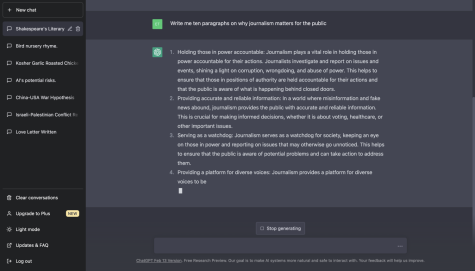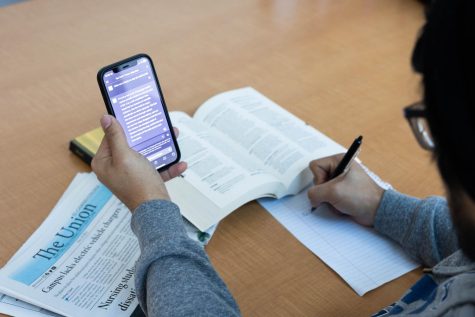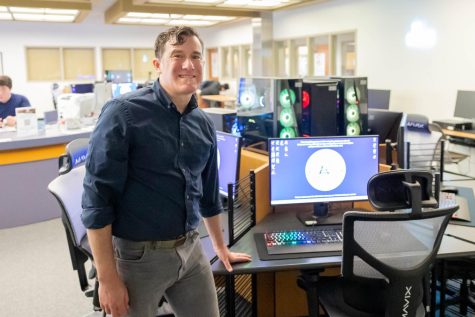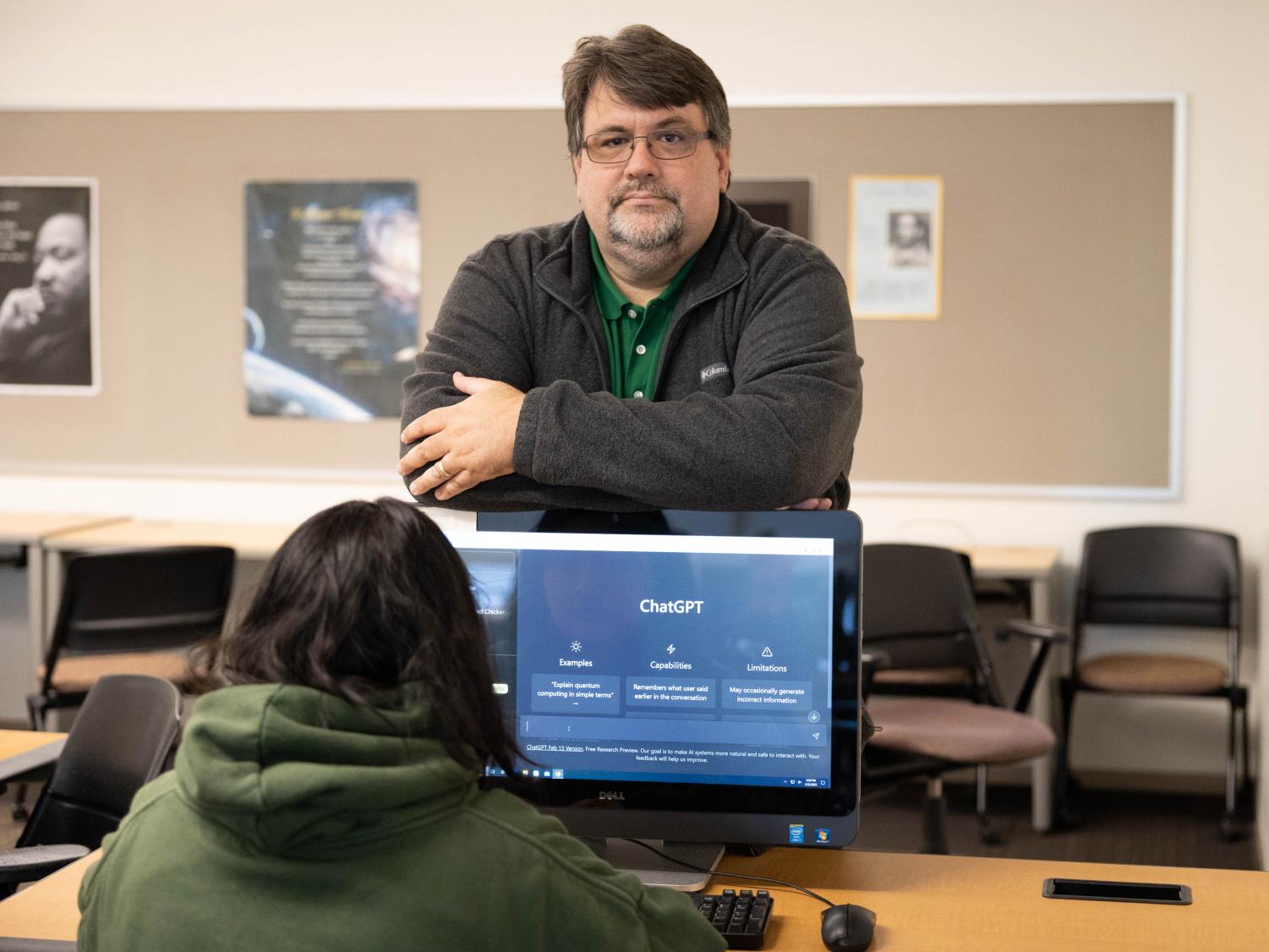Me, myself and AI: College officials grapple with new challenges regarding ChatGPT
March 1, 2023
Writer’s Note: The first two paragraphs of this story were written by ChatGPT
As artificial intelligence software gains ground in the academic sphere, educators are divided on its potential impact. Some see it as a way to improve student engagement and personalize instruction, while others are skeptical of its accuracy and impartiality in assessments.
As the debate over artificial intelligence in education intensifies, questions arise about the future of teaching and learning in the digital age.
Released on Nov. 30, 2022, ChatGPT is an AI text generator created by research laboratory OpenAI. The company was founded in 2015 and purchased outright by Microsoft in 2020 after initially investing $1 billion into the company a year prior in 2019. After its initial release, the company received another $10 billion investment in January, according to Bloomberg.
Although not the first artificial intelligence (AI) text generator to be created, ChatGPT took the world by storm, rallying over 100 million users in two months.
Universities and colleges raced to discuss the uses of ChatGPT, from some outright banning it for use on assignments to others finding special uses for it. Many are clueless as to how they must respond to the software that has seemingly unlimited academic potential.
At El Camino College educators and administrators have different thoughts on the topic, but all agree they can’t ignore the issue.
Initially hired as an English professor in 2016, Coordinator for the Writing Center Christopher Glover insists the best way to defend against software like ChatGPT is to incorporate it into lesson plans, not to ban it outright.
“Our job has never been to be police,” Glover said. “We’re here to help students become better writers and we’re going to do everything we can to give them the tools that they need to be able to write effectively on their own, maybe with using things like [ChatGPT] as a helping tool.”

AI as an educational tool
In Glover’s eyes, students can use ChatGPT as an artificial thought partner, something to throw ideas against, the same way they would with a classmate or professor to brainstorm.
“If what happens is a dialogue, even if it’s with something artificial, it can lead to a better understanding of that idea, [which] can then be communicated in the form of writing,” Glover said.
Glover has confidence the AI software available cannot replace human thought or interaction, citing an English department colleague who shared an article about ChatGPT and joked that their jobs would soon be obsolete. But Glover insists the software, in its current state, is not there yet.
“Until an AI is a substitute for those things, I think our jobs are safe,” Glover said. “But I think we need to be diligent and honest with ourselves about what it has the potential to do.”
There are many who think like Glover including English professor Christopher Page who fed the software one of his assigned writing prompts in order to see the text responses it could generate.
Page described the results as “OK” but he wouldn’t call what the software produced as higher education-level writing. Instead, he thinks educators should lean into AI instead of running from it.
“It’s going to push us to focus more on revising our writing,” Page said. “[I think] it’s going to shift us to focus on the critical thinking aspect of reading and writing, the part that a machine can’t do, at least not yet.”
Page believes the software will usher in significant changes in education. Hoping instead of the initial negative “knee-jerk” reactions coming from colleges across the nation, Page thinks there is a benefit to focusing more on adaptation.
“What we don’t want to do is to make writing go backward, we don’t want to say writing has to now be all pen and paper,” Page said. “Our reaction should not be to turn students into suspects, that’s a horrible way to teach.”
Distance Education Faculty Coordinator Moses Wolfenstein, whose responsibilities include teaching faculty how to navigate the online Canvas system, views the emergence of artificial intelligence as a way to step up the assessment of students with a more unique approach.
Wolfenstein thinks the use of video for more assignments could help educators see “whether or not their students get it.”
“If you give a good assignment that’s got an interesting hook, your students are just more likely to do it anyway,” he said.
In the short term, Wolfenstein is not worried about the use of AI in the classroom and thinks faculty can adapt to the rapidly changing technology landscape.
“The sky is not falling yet,” Wolfenstein said. “But ‘yet’ is the operative word. I am very concerned about what AI is going to look like in 10 years; if you look at where we were with AI 10 years ago, nobody anticipated [ChatGPT].”

Grappling with academic dishonesty
While many at El Camino see revolutionary uses of ChatGPT, others within the community are more skeptical about what a tool like this could mean for academic dishonesty.
Vice President of Institutional Effectiveness for the Academic Senate Kevin Degnan understands the reasons why some educators are incorporating the software into their lessons. However, Degnan does not see a legitimate pathway for how to ethically use it within a classroom right now.
“Using an AI to fully write an essay is like getting somebody else to do it,” Degnan said. “It’s artificial intelligence rather than organic intelligence but either way it’s not the individual student’s [original thought].”
Also an English professor, Degnan is not sure he would be comfortable with one of his students using it even to help with the “backbone” of an essay but is always open to using new tools to help students succeed.
At the Writing Center, tutor Ginger Mallery disagrees with Glover that ChatGPT can be used as a tool to generate ideas rather than holding firm on the position that students will use it to write essays.
“It is 100 percent cheating,” Mallery said. “It is a free way to get a paper completely written for you.”
Tutor Elizabeth King agrees.
“I think it’s dishonest,” King said. “If you’re not creating your ideas on your own, you’re not doing the assignment, are you? There is a fine line between inspiration and plagiarism… if you have a model set in front of you it’s hard to create original ideas.”

Preparing for the future
President of the Board of Trustees Kenneth Brown recognizes the value of taking a step back before outright banning the software. He said the best thing El Camino and other institutions can do right now is to learn as much as they can.
“The campus community needs to understand that these tools are available for our students and our staff,” Brown said. “So maybe we can just at the very least give them an overview… let’s make sure that folks have had an understanding of what’s out there and what the truths are.”
Brown has heard of certain people within the Los Angeles Unified School District calling for an outright ban on the AI software but he does not think the board should ever dictate how professors teach at El Camino.
Wolfenstein, who is also the Chair of the Academic Integrity Committee, agrees with Brown and uses his position to start a dialogue with other instructors and professors.
On Friday, Feb. 24, Wolfenstein hosted an online Zoom faculty roundtable as a free-form brainstorming session about what others believe the college should do with ChatGPT. Meant more as a conversation starter, and not a place for definitive policy change, the virtual discussion was attended by over 40 El Camino faculty members.
“We’re not necessarily looking for answers yet, this is more of a listening session,” Wolfenstein said. “I certainly didn’t come with any answers.”
During the meeting, Wolfenstein admitted he had asked the software itself about some ways educators could “defeat it.” Some of the solutions the software suggested included asking students to include draft work or assigning nontraditional coursework such as video responses instead of essays.
Wolfenstein said he is currently working with an Academic Integrity Committee student representative and the Associated Students Organization to organize a similar meeting for students to voice their own thoughts.
“I would say that basically everybody [in the world] is at the stage where we need to learn and talk about it, we need to hear from everybody,” Wolfeststein said. “It’s a big jump, it’s not ‘Data from Star Trek’ yet, but maybe one day.”
Editor’s Note:
- Corrected mislabeling of the Writing Center and misidentification of a job title on March 2, 2023, at 11:34 p.m.

